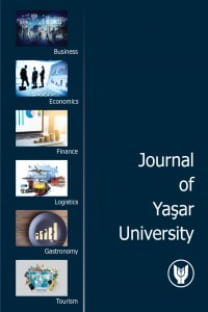Evaluating the Organizational Culture Types of the 5-Star Hotel’s in Istanbul in terms of the Cameron & Quinn Competing Values Model
Örgüt kültürü, işletmelerdeki inanç ve değerler, davranış normları, formal ve informal sistem süreç ve yöntemlerin bir birleşimdir. 1980’den itibaren işletme alanında önemli bir görüngü olan örgüt kültürü, turizm işletmelerinde de iş görenlerin davranışların tanımlamada önemli bir konu haline gelmiştir. Turizm işletmelerinden biri olan otel işletmelerinde örgüt kültürü, iş görenleri ortak bir amaç doğrultusunda belirsizliklere karşı hareket ettirmeye ve iş görenlere güvenli bir yolda ilerlemeyi sağlamaktadır. Bu araştırmada, İstanbul’da hizmet veren 5 yıldızlı otel işletmelerinde Cameron ve Quin’in ortaya koyduğu “Rekabetçi Değerler Modeli” kapsamında örgüt kültürü tipleri (Adokrasi, Klan, Bürokrasi ve Pazar) açısından değerlendirilmesi yapılmıştır. Araştırma kapsamında, beş yıldızlı otellerde 335 iş görene anket uygulanmıştır. Araştırma sonucunda ise, örgüt kültürü tipleri ortalamalarının oldukça yüksek olduğu ancak aralarında belirli bir farkın olmadığı görülmüştür
Abstract: Organizational culture is the combination of the beliefs, values, behavior norms, formal and informal system processes and methods. As of 1980, the organizational culture, which is an important phenomenon in business management, has become a dominant issue in defining the behaviors of the employees in tourism business. Organizational culture in hotel businesses ensure that the employees are motivated towards acting against uncertainties with a mutual purpose, and that they move in a safe path. In this study, the 5-star hotels in İstanbul have been evaluated in terms of organizational culture type (Adhocracy, Klan, Bureaucracy and Market) set by Cameron and Quinn “Competing Values Model”. In the study context, 335 employees replied to questionnaires in 5-star hotels. At the end of the study, it has been determined that the mean values of the organizational culture types are higher; however, there are no clear differences among culture types. Keywords: Organizational Culture, Organizational Culture Types, Hotel Businesses, Competing Values Model
Keywords:
Organizational Culture Organizational Culture Types, Hotel Businesses, Competing Values Model,
___
Altman, Y., & Baruch , Y. (1998). Cultural Theory and Organizations: Anlaytical Method and Cases. Organization Studies, 769-785.Baum, T. (2008). Implications of hospitality and tourism labour markets for talent management strategies. International Journal of Contemporary Hospitality Management, 720-729.
Brown, E. A., Arendt , S., & Bosselman , R. (2014). Hospitality Management Gradutes' Perceptions of Career Factor Importance and Career Factor Experince . International Journal of Hospitality Management, 58- 67.
Cameron, K. S., & Quinn , R. (2006). Diagnosing and Changing Organizational Culture: Based on the Competing Values Framwork. San Francisso : The Jossey- Boss: Business and Management Series .
Clugston, M. (2000). The Mediating Effects of Multidimensional Commitment on Job Satisfaction and İntent to Leave. Journal of Organizational Behavior , 477-486.
Cohen, A. (1993). Age and Tenure in Relation to Organizational Commitment: A Meta-Analysis. Basıc and Applıed Socıal Psychology, 143-149.
Dawson, M., Abbott, J., & Shoemaker, S. (2011). The Hospitality Culture Scale: A Measure Organizational Culture and Personel Attributes. International Journal of Hospitality Management, 30(2), 290-300.
Deal, T. E., & Kennedy , A. (1982). A Corporate Culture. Reading : M.A. Addison Wesley.
Deery, M. A., & Shaw, R. (1999). An investigation of the relationship between employee turnover and organizational culture. Journal of Hospitality & Tourism Research, 387–400.
Erdem, T. (2010). Örgüt Kültürü İşletmelerin Başarısındaki En Temel Paradigma. İstanbul: Beta Yayınları.
Helms, M., & Stern, R. (2001). Exploring the Factors that Influence Employees‘ Perceptions of their Organization‘s Culture. Journal of Management in Medicine, 15(6), 415-429.
Hofstede, G., Neuijen, B., Ohayv, D., & Sanders, G. (1990). Measuring Organizational Cultures: A Qualitative and Quantitative Study Across Twenty Cases. Administrative Science Quarterly, 35(2), 286-316.
Jackson, N., & Carter, P. (2007). Rethinking Organisational behavior: A Potstructuralist Framwork. Leicester: Prentice Hall/ Finacel Times.
Kocaman, S., Kocaman , S., & Neşe, Ç. (2012). Konaklama İşletmelerınde Örgüt Kültürünün Örgütsel Çatışma Üzerıne Etkilerı: Alanya Bölgesınde Bır Araştırma. Sosyal Bilimler Enstitüsü Dergisi, 167-183.
- ISSN: 1305-970X
- Başlangıç: 2006
- Yayıncı: Yaşar Üniversitesi
Sayıdaki Diğer Makaleler
SAĞLIK İDDİASI İÇEREN GIDA REKLAMLARININ İLETİŞİM ETKİSİNDE SAĞLIK İLGİNLİĞİNİN ROLÜ
Sürdürülebilir Turizm: Alaçatı Destinasyonuna Yönelik Bir Uygulama
REEL DÖVİZ KURUNUN TÜRKİYE’NİN TURİZM GELİRLERİ ÜZERİNDEKİ ETKİSİNİN AMPİRİK ANALİZİ
Merve OZ, Fazil KAYA, Ibrahim CIFCI
Evaluation of Validity and Reliability of the Turkish Version of the E-lifestyle Instrument
Mehmet OZAYDIN, Emine ILHAN, Mehmet BAYRAK
